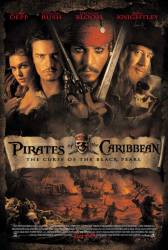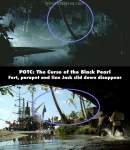Factual error: Captain Norrington is "promoted" to Commodore. However, commodore was not a rank in the British navy (it is now, not then), but a posting. A post captain could be appointed commodore (meaning he commanded more than one vessel) for a specific task, but when that task was completed, he became a post captain again. A promotion would have made Norrington an admiral. (00:11:30)
Suggested correction: That is correct in itself, but a very narrow view on what is shown in the movie. The Royal Navy obviously tasked Norrington with some command worthy of being called Commodore, so they could have just decided to embellish it a little bit and host him a fancy ceremony. That is all we see. Civilians like the governor might not even be aware of the technical definition and simply see this as a promotion to be celebrated, especially if you want to wed your daughter to him.
Factual error: The British warships in the film - and in the whole series, for that matter - are painted in a livery far too modern for the period in which the film is evidently set. The "Golden Age of Piracy," during which the movie takes place, occurred in the early 1700s, but the Royal Navy did not begin using the yellow-and-black "Nelson Chequer" on its vessels until the Battle of Trafalgar in 1805. Even if the film were actually set in the later period, there would still be an inaccuracy in that the Marines' headwear would be incorrect - they transitioned from the tricorne to a round hat in 1802.
Suggested correction: This is not completely correct; it did not originate with Nelson. It only became immensely popular and somewhat uniform in its use after his victory at Trafalgar. The Royal Navy mandated the use of a uniform yellow and black paint job as early as 1715, but that order was routinely ignored. Still, it would not have been impossible or improbable for the two ships in the film to be black and yellow.
Factual error: When Norrington is "promoted" to Commodore (already addressed as an error in and of itself), the promotion ceremony held for him in Port Royal would have been meaningless. A commander-in-chief of a foreign station in the British Navy could indeed promote acting officers beneath him, but these commissions would be unofficial until confirmed by the Lords of the Admiralty in London. And as it appears that Norrington is the commander-in-chief at his station, there would be no one to promote him at all - a governor, such as Swann, did not have the authority to do so. The only actual, official ceremonies of promotion in the Royal Navy was for a captain to be given his commission, and to be "read in" aboard his ship, the formal act of taking command. There would be little cause for celebration until a commission was confirmed by the "Sea Lords," in any case.
Suggested correction: How do we know that Norrington's promotion is not already confirmed? And even if the ceremony is 'meaningless', its taking place would still not be an error. The governor, the Navy, the bored people of Port Royal, or even Norrington himself could have organized this ceremony as a little flourish just for their entertainment and to honor an accomplished officer. Nothing in the ceremony shown in the film even looks like an official act; Norrington is just handed his sword, and that's basically it.
Factual error: Elizabeth would not have slept undercovers, nor would she have needed a bed warmer in Jamaica in an un-air conditioned room.
Suggested correction: This is not an error, but it could easily be a personal preference of Elizabeth. Even today, people sleep with heat blankets in moderate temperatures just because they like it that warm. Also, the climate in 18th century Jamaica was highly likely different from today's climate. But even in present times, I have had nights on holiday in Jamaica that felt quite chilly to me.






